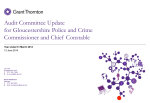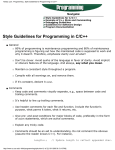Download The Audit Plan – template user guide
Transcript
Audit Committee Sector Update for Shropshire Council Year ended 2013 June 2013 Grant Patterson Director T 07880 456114 E [email protected] Erik Bagnall Manager T 0121 232 5415 E [email protected] Bethan Vaghela In Charge Accountant T 0121 232 5268 E [email protected] © 2013 Grant Thornton UK LLP | Report Name | Date . The contents of this report relate only to the matters which have come to our attention, which we believe need to be reported to you as part of our audit process. It is not a comprehensive record of all the relevant matters, which may be subject to change, and in particular we cannot be held responsible to you for reporting all of the risks which may affect your business or any weaknesses in your internal controls. This report has been prepared solely for your benefit and should not be quoted in whole or in part without our prior written consent. We do not accept any responsibility for any loss occasioned to any third party acting, or refraining from acting on the basis of the content of this report, as this report was not prepared for, nor intended for, any other purpose. . Contents Section Introduction Audit update as at June 2013 Page 4 5-6 Emerging issues and developments Accounting and audit issues 7 Local government guidance 8-16 © 2013 Grant Thornton UK LLP | Report Name | Date 3 Introduction This paper provides the Audit Committee with a summary of emerging national issues and developments that may be relevant to you as a Unitary Council. The paper also includes: • an update on progress in delivering our responsibilities as your external auditors • a number of challenge questions in respect of these emerging issues which the Audit Committee may wish to consider. Members of the Audit Committee can find further useful material on our website www.grant-thornton.co.uk, where we have a section dedicated to our work in the public sector. Here you can download copies of our publications – 'Towards a tipping point?', Local Government Governance Review 2012', 'The developing internal audit agenda', 'Preparing for the future' and 'Surviving the storm: how resilient are local authorities?' If you would like further information on any items in this briefing, or would like to register with Grant Thornton to receive regular email updates on issues that are of interest to you, please contact either your Engagement Lead or Audit Manager. Grant Patterson Engagement Lead T 07880 456114 Erik Bagnall Manager T 0121 232 5415 © 2013 Grant Thornton UK LLP | Report Name | Date [email protected] [email protected] 4 Audit Update as at June 2013 Work Planned date Complete? Comments 2012-13 Accounts Audit Plan We are required to issue a detailed accounts audit plan to the Council setting out our proposed approach in order to give an opinion on your 2012-13 financial statements. March 2013 Yes We presented our Audit Plan to the Audit Committee in March 2013. We will discuss the detailed arrangements for our final accounts visit with Officers in July 2013 following receipt of your financial statements. Should the plan presented require updating we will report back accordingly to the Audit Committee. Interim accounts audit Our follow up of interim fieldwork in March included the following: • Operating expenditure, PPE ( property, plant and equipment), welfare expenditure, housing rents revenue and employee remuneration - walkthrough testing conducted. • Early feedback on emerging accounting issues e.g. a review of the Council's PFI waste model to address technical accounting issues following discussions with your finance staff. • Review of overarching IT arrangements. March 2013 Yes Walkthrough testing has been completed and there are no issues which we are required to bring to the Audit Committee's attention. We have conducted early testing in areas such as journal controls, payroll and income invoices and there are no issues to report to the Audit Committee at this stage of the audit. Following discussions with officers we have undertaken a review of the Council's PFI waste model. Our work has confirmed that accounting adjustments will be required to resolve issues around reporting the liabilities at the end of the contract which had been identified by the Council's model. They also identified other technical accounting issues which will need further consideration. We will review the adjustments made to the PFI model as part of our financial statements audit and report these where appropriate. We have undertaken a review of the Council's overarching IT arrangements and have identified a small number of non significant control weaknesses in areas such as administrator / access management rights. Management are considering their response. We will report on the outcomes at the September Audit Committee in our ISA 260 report. © 2013 Grant Thornton UK LLP | Report Name | Date 5 Audit Update as at June 2013 Work Planned date Complete? Comments 2012-13 Final accounts and VFM audit Including: Start date: 8 July 2013 The audit of the 2012-13 financial statements is due to start on 8 July 2013. • audit of the 2012-13 financial statements By 30 September 2013 Due July and September 2013 as shown. • proposed opinion on the Council 's accounts • proposed Value for Money conclusion. By 30 September 2013 Detailed VFM risk assessment and financial resilience work underpinning the VFM conclusion to be carried out in June and July 2013. The proposed additional work to support the VFM conclusion in respect of ip&e Ltd has been deferred as a result of the decision to delay the transfer of services into the company until 2013-14. Therefore this is likely to be considered in forming the opinion for the 2013-14 VFM conclusion. The proposed opinions on the Council's 2012-13 accounts and Value for Money conclusion will be reported to the September Audit Committee. © 2013 Grant Thornton UK LLP | Report Name | Date 6 Emerging issues and developments Accounting and audit issues Local government accounts timetable The key dates in the local government accounts timetable are as follows: • by 30 June - the responsible financial officer certifies the presentation of the draft statement of accounts • by 30 September: - the responsible financial officer recertifies the presentation of the final statement of accounts before members’ approval - members approve the statement of accounts - the statement of accounts is published, with the audit opinion, certificate and audit report if issued by the auditor. The key dates for Whole of Government Accounts are: • by 31 July - submission of unaudited WGA L-Pack by authority • by 7 October - submission of audited WGA L-Pack by auditor We can confirm that we have had discussions with your finance team and are satisfied that: • your Head of Finance, Governance and Assurance has produced an adequately resourced timetable for the production and submission of its 2012/13 financial statements; and, • that this been discussed and agreed with us as your External Auditors. © 2013 Grant Thornton UK LLP | Report Name | Date 7 Emerging issues and developments Accounting and audit issues Carbon reduction commitment scheme The Carbon Reduction Commitment (CRC) Energy Efficiency scheme is intended to improve energy efficiency and reduce emissions in line with the Climate Change Act 2008. Under the scheme, authorities need to buy allowances for their carbon dioxide (CO2) emissions. The CRC Scheme will not apply to every local authority, only those authorities covered by the CRC Scheme will need to implement the requirements. An authority will qualify as a CRC participant based on their half-hourly electricity usage. Between June and July 2013 authorities will be able to purchase allowances for 2012/13, and in July 2013 participating local authorities are required to surrender purchased allowances in relation to CO2 emissions reported for the financial year 2012/13. IAS 37: Provisions, Contingent Liabilities and Contingent Assets, requires that a provision is recognised when: • an entity has a present obligation because of a past event. The obligating event occurs when an authority produces emissions that require it to purchase and surrender allowances in accordance with the CRC Scheme’s requirements at the reporting date; • it is probable that an outflow of economic benefit will be required to settle the obligation. The details of the scheme and the timetable for the transactions set out in the 'CRC Energy Efficiency Scheme (Allocation of Allowances for Payment) Regulations 2012' makes it probable that an outflow of resources will be required; and • a reliable estimate can be made of the amount of the obligation. The Regulations confirm that the allowances will be priced at £12 per tonne of carbon dioxide. This makes it possible to estimate the amount of the obligation, provided the authority has arrangements in place to measure or estimate the level of CRC emissions in 2012/13. As the obligation to meet CRC responsibilities arises during 2012/13, the obligation should be accounted for at 31 March 2013. Any allowances held should be classified as either current intangible assets in accordance with section 4.5 of the Code, or, if held for the purpose of trading, as a current asset. Challenge questions: • Has your Head of Finance, Governance and Assurance considered the need for additional provisions? © 2013 Grant Thornton UK LLP | Report Name | Date 8 Emerging issues and developments Accounting and audit issues UK Public Sector Internal Audit Standards From 1 April 2013, the UK Public Sector Internal Audit Standards (PSIAS) are to be used throughout the public sector. The PSIAS are based on existing International Standards for Internal Audit, but have been adapted for use in the public sector. The objectives of the PSIAS are to: • define the nature of internal auditing within the UK public sector • set basic principles for carrying out internal audit in the UK public sector • establish a framework for providing internal audit services, which add value to the organisation, leading to improved organisational processes and operations, and • establish the basis for the evaluation of internal audit performance and to drive improvement planning. The key changes are: • the term ‘chief audit executive’ is used rather than ‘head of internal audit’ or ‘chief internal auditor’. • the requirement for an internal audit charter. This must formally define the purpose, authority and responsibility of the internal audit activity, as well as the nature of consulting services and the terms ‘board’ and ‘senior management’. It will also cover arrangements for avoiding conflicts of interest if internal audit carries out any non-audit activities. • there is no longer a requirement to produce an audit strategy. Instead, a risk-based plan must incorporate or be linked to a strategic or high-level statement which sets out how the internal audit service will be provided and developed in accordance with the charter and how it will link to the organisation’s objectives and priorities. • the chief audit executive must develop and maintain a quality assurance and improvement programme that covers all aspects of the internal audit activity. This includes internal and external assessments. The QA&IP is designed to assess the efficiency and effectiveness of internal audit as well as identify opportunities for improvement. The chief audit executive will have to include a statement on the results of the QA&IP in an annual report. Challenge questions: • The Audit Committee received an update on the changes from your Internal Auditor in March 2013. Are you happy with the plans in place to assess your internal audit function against the requirements of the PSIAS? Grant Thornton can provide a review of internal audit effectiveness. If you have any queries, talk to your engagement manager to see how Grant Thornton could help. © 2013 Grant Thornton UK LLP | Report Name | Date 9 Emerging issues and developments Grant Thornton Local Government Governance report In February, we published 'Local Government Governance Review 2013', our second annual review into local government governance. The report is based on: • survey responses from over 60 council senior officers and members on governance reporting and the supporting processes • a desk top review of 2011/12 Annual Governance Statements and explanatory forewords for 153 councils, against our best practice checklists based on the CIPFA/SOLACE framework and guidance notes. Good governance is essential to both council leaders and the public. It supports leaders in making the best decisions, reduces the likelihood of things going wrong and protects them when problems do occur. It inspires confidence in the public that the best decisions are being taken for the right reasons, that the quality of service is protected and that public money is being wisely spent. The key findings included: • one third of survey respondents do not consider that council accounts are aimed at the public and the length and technical complexity makes them difficult to understand • many council Annual Governance Statements follow too rigidly the example text in the CIPFA/SOLACE guidance, rather than reflecting the unique features and challenges of their own organisation • explanatory forewords are often far from ‘explanatory’, being hard to read and not aligned to councils’ strategic goals • on-going governance processes and year-end statements are commonly two distinct exercises. • there is often a lack of understanding within local authorities about what the governance framework is for and how it fits together • although external alliances are becoming increasingly important in service delivery, 21% of survey respondents are not clear about council roles and responsibilities when working in partnerships. Challenge questions: • Are you clear on the actions being considered to review and improve governance arrangements? Grant Thornton can provide you with a bespoke, bench-marked governance review. If you have any queries on governance, talk to your engagement manager to see how Grant Thornton could help. © 2013 Grant Thornton UK LLP | Report Name | Date 10 Emerging issues and developments Local government guidance Financial sustainability of local authorities In January, the National Audit Office published 'Financial sustainability of local authorities'. The report examined central government’s approach to local authority funding, and reviewed local authorities’ financial sustainability against a background of changes to their funding. It has three parts: • Funding local authority services - setting out the background to the current funding arrangements and the reduction in local authority funding from the government’s 2010 spending review • Local authority budget management - setting out how local authorities have responded to their reduced income • Maintaining financial sustainability - covering the growing challenges to local authorities’ financial sustainability, managing financial risks and opportunities, and the increasing need for central government to make informed decisions as financial and service pressures increase. Some of the key findings were: • so far, local authorities have absorbed reductions in central government funding but there is some evidence that services have been reduced • local authorities may find it harder over the rest of the spending review period to absorb funding reductions and maintain services • local authorities’ ability to make savings while maintaining service levels depends on local circumstances • by reducing ring-fencing of its grants, central government aims to give local authorities greater spending flexibility • the government is making changes that create financial opportunities for local authorities but also increase their financial risks and uncertainty, for example, the partial localisation of business rates and the arrangements for council tax benefit • the accountability framework for local government to address widespread financial failure is untested. Challenge questions: • Can your authority learn from how other local authorities have responded to their reduced income? © 2013 Grant Thornton UK LLP | Report Name | Date 11 Emerging issues and developments Local government guidance Pay policy statements The Secretary of State for Communities and Local Government has issued supplementary guidance on pay policy statements for 2012/13 which highlights: • members should ensure that pay policy statements are set out clearly, that they fully address all of the requirements of the Localism Act 2011 and accompanying guidance, and are accessible. • full Council should be given the opportunity to vote on salary packages of £100,000 or more. Those authorities who may not have senior posts over £100,000 should seek to achieve the same degree of openness and accountability by adopting a lower threshold for votes, appropriate to their local circumstances. • full Council should also be given the opportunity to vote on severance payments over £100,000. Challenge questions: • Are you clear on how you have considered how to improve the clarity and value of the information your authority is publishing? © 2013 Grant Thornton UK LLP | Report Name | Date 12 Emerging issues and developments Local government guidance Councillors on the frontline The government has responded to the Select Committee report on the role councillors play in the community. Some of the matters raised by the Select Committee were as follows: • In supporting their communities, councillors should be working closely with external organisations and providers of public services. • It urges all councils to consider how best to provide support to their councillors and assist them to ensure they have an active role in their communities. • It is a matter of concern that the composition of many councils does not reflect that of the communities they serve. • Local authorities should be actively promoting democratic engagement and explaining to the public what the role of a councillor entails. • encourage local authorities to put in place light touch arrangements for reporting councillor performance. As part of this, councillors could be asked to complete a brief annual self-assessment to be made public in an accessible format. This should cover not only attendance at formal meetings, but also details of the work councillors have carried out within their communities. • Encourage political parties, local authorities and other bodies to review the training they offer to ensure it meets the needs of councillors. In particular, training should reflect the changing roles of councillors, and ensure that councillors understand the implications of the Localism Act 2011 and other new legislation. Also suggest that councillors make public details of any training they have completed in the course of the preceding year. Training should be seen as a benefit, not a cost, to local taxpayers. • Training should be provided to potential candidates before they stand for election, to give them some knowledge of what they can from being a councillor. expect • Councillors should be at the centre of community life, well known and respected by those they represent, and empowered to effect change within their local areas. Challenge questions: • Is the authority considering what it can or needs to do to improve the role played by councillors in the community? © 2013 Grant Thornton UK LLP | Report Name | Date 13 Emerging issues and developments Local government guidance Draft local audit bill The Draft Local Audit Bill was published last year to enable consultation and pre-legislative scrutiny. In January, the Draft Local Audit Bill ad hoc Committee published 'Pre-Legislative Scrutiny of the Draft Local Audit Bill'. The Committee concluded that a number of areas required further examination – most significantly the independent appointment of auditors. The Government plans to introduce the new regulatory regime in 2015/16. The proposals include the following: • The Financial Reporting Council will act as the overall regulator for auditors and the National Audit Office will set the code of audit practice. • From 1 April 2017, local government bodies will appoint their own auditors, in consultation with an independent auditor panel. • In addition to giving their opinion on the financial statements, auditors will continue to have wider responsibilities. These include considering the arrangements for securing economy, efficiency and effectiveness in their use of resources and having the duty to report in the public interest. The draft bill is still to go through Parliament for approval. Challenge questions: • Have you considered how the proposed audit arrangements under the Draft Local Audit Bill will affect you? © 2013 Grant Thornton UK LLP | Report Name | Date 14 Emerging issues and developments Local government guidance Local Authorities (Health and Wellbeing Boards and Health Scrutiny) Regulations 2013 The Local Authorities (Health and Wellbeing Boards and Health Scrutiny) Regulations 2013 have now been published by the Secretary of State for Health. The regulations will allow local authorities to finalise local preparations for health and wellbeing boards and health scrutiny arrangements. The regulations relating to health and wellbeing boards aim to provide local areas with the flexibility and freedom to shape their health and wellbeing boards as best fits with local circumstances. In particular: • health and wellbeing boards will be free to establish sub-committees and delegate functions to them • voting restrictions have been lifted so that non-elected members of a health and wellbeing board (i.e. CCG representative, local Healthwatch, Directors of Public Health, Children’s Services and Adult Social Services and any wider members) could vote alongside nominated elected representatives on the board • political proportionality requirements have also been lifted so that the question of political proportionality of health and wellbeing board membership is left to local determination. The regulations in relation to health scrutiny make provision for local authorities to review and scrutinise matters relating to the planning, provision and operation of the health service in their area. There are new obligations on NHS bodies, relevant health service providers and local authorities around consultations on substantial developments or variations to services to aid transparency and local agreement on proposals. In February, the Local Government Association and Association of Democratic Services Officers jointly published a practical guide to support local authorities in interpreting and implementing the constitutional and governance aspects of the legislation. This includes a summary of key issues for local authorities to consider. Challenge questions: • Has your authority addressed all the issues for consideration set out in the joint practical guide? • What further action does your authority need to take to implement the regulations? © 2013 Grant Thornton UK LLP | Report Name | Date 15 Emerging issues and developments Local government guidance Guidance on local authority charging for public health activity From April 2013 upper tier and unitary local authorities in England will have a new duty under section 2B of the National Health Service Act 2006 to take such steps as they consider appropriate for improving the health of the people in their areas. As a result, they will take on responsibility for a range of public health services previously provided by the NHS. In February, the Department of Health published guidance for local authorities on what health improvement activity they can charge for and what services must be free at the point of use. Challenge questions: • Have your officers assessed the impact on the authority? New funding reforms for care and support In February, the Government announced new funding reforms to ensure that the individuals get the care required without facing unlimited costs. The reforms are based on the recommendations made in 2011 by the Dilnot Commission, an independent panel set up to look at the fairest and most sustainable way to fund care and support in England. From April 2017, there will be: • a cap on care costs • financial protection for those with modest wealth. From April 2015: • individuals will not have to sell their home in their lifetime to pay for residential care • individuals will have clearer entitlements. A national minimum eligibility will make access to care more consistent around the country, and carers will have a legal right to an assessment for care for the first time. Challenge questions: • Have your officers assessed the impact on the authority? © 2013 Grant Thornton UK LLP | Report Name | Date 16 © 2013 Grant Thornton UK LLP. All rights reserved. 'Grant Thornton' means Grant Thornton UK LLP, a limited liability partnership. Grant Thornton is a member firm of Grant Thornton International Ltd (Grant Thornton International). References to 'Grant Thornton' are to the brand under which the Grant Thornton member firms operate and refer to one or more member firms, as the context requires. Grant Thornton International and the member firms are not a worldwide partnership. Services are delivered independently by member firms, which are not responsible for the services or activities of one another. Grant Thornton International does not provide services to clients. grant-thornton.co.uk





























